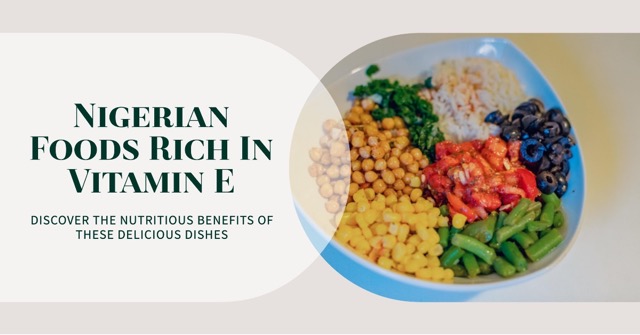Looking for Nigerian foods rich in Vitamin E?
Then you're on the right page.
Because in this post, you'll discover the complete list of Nigerian foods high in Vitamin E and their vitamin E count.
let's get to the list right away...

Nigerian Vitamin E-Rich Foods
Here are 18 foods rich in vitamin E you can find in Nigeria:
1. Mango
Mango is a great source, providing around 2mg per fruit. Mangoes also supply high amounts of vitamin C, vitamin A, and carotenoids like beta-carotene.
2. Cashews
Cashews contain around 5mg of vitamin E per 100g. They also supply magnesium, zinc, iron, phosphorus, selenium, and copper.
3. Peanuts
Peanuts have about 5mg of vitamin E per 100g serving (2). In addition, they are high in niacin, fiber, protein, magnesium, phosphorus, and manganese.
4. Tomatoes
Tomatoes contain approximately 1mg of vitamin E per medium-sized tomato. Tomatoes are also packed with vitamin C, potassium, lycopene, and antioxidants. Add tomatoes to stews, salads, sauces, and side dishes. Choose brightly colored, vine-ripened tomatoes for maximum nutrition.
5. Spinach
Spinach has around 1mg of vitamin E per cooked cup. This leafy green is also high in vitamin K, A, C, folate, magnesium, iron, and carotenoids like lutein (5). Use spinach in soups, stews, stir fries, and salads. Cooking increases the vitamin E availability.
6. Palm oil
Red palm oil is the richest dietary plant source of vitamin E, with approximately 16mg per 100g. Red palm oil also contains high amounts of vitamin A and lycopene.
7. Eggs
Eggs provide around 1mg of vitamin E in each egg yolk. The yolk also supplies cholesterol to produce hormones and vitamin D.
8. Chicken liver
Chicken liver is an excellent source, with 3mg in a 3 ounce serving. Liver is also high in iron, vitamin A, folate, and copper.
9. Almonds
Almonds contain about 5mg of vitamin E per 100g serving (13). They provide healthy fats, fiber, magnesium, calcium, phosphorus and riboflavin as well. Enjoy almonds raw or roasted for a nutritious snack.
10. Sunflower oil
Sunflower oil has approximately 5.6mg of vitamin E per tablespoon, providing over a third of the daily value. Use sunflower oil for cooking, baking and dressing salads.
11. Kiwifruit
Kiwifruit are small but pack a vitamin E punch, with 1mg per medium fruit. Kiwis also offer vitamin C, potassium, folate and copper.
12. Olive oil
Olive oil contains around 2mg of vitamin E per tablespoon. A kitchen staple, olive oil is perfect for salad dressings, marinades, sautéing and roasting veggies.
13. Red bell peppers (tatase)
Red bell peppers provide nearly 2mg of vitamin E per medium pepper. Red peppers are an excellent source of vitamin C, vitamin B6 and carotenoids like beta-carotene.
14. Prawns
Prawns contain about 2mg of vitamin E in a 3-ounce serving. Prawns supply selenium, zinc, copper and vitamin B12 as well.
15. Snails
Snails are a Nigerian delicacy that offer 5mg of vitamin E in a 100g cooked serving. Snails provide iron, magnesium, potassium, zinc and copper.
16. cocoyam
Some starchy staples like white cocoyam also contain vitamin E, with 2.5mg per boiled cup.
17. butter
Butter provides a small amount of vitamin E, around 2mg per tablespoon, along with vitamin A. Use butter in moderation to enhance absorption of vitamin E from other foods.
18. Avocados
Avocados are rich in monounsaturated fat and offer 2mg of vitamin E per medium fruit, along with fiber, folate and potassium (20).
What Is Vitamin E And Why Is It Important
Vitamin E is an important vitamin that has many benefits in the body. It works as an antioxidant to protect cells from damage and support overall health in many ways.
Some key functions of vitamin E include:
- Boosting immune function
- Maintaining healthy, youthful skin
- Preventing blood clots from forming
- Protecting eye health and vision
- Delaying cognitive decline and risk of Alzheimer's disease
Vitamin E achieves these benefits largely through its antioxidant properties (1). Antioxidants neutralize free radicals, which are unstable molecules that can damage cells and contribute to disease.
"Vitamin E has the ability to protect cells from free radical damage as well as reduce the production of free radicals in certain situations."
As an antioxidant, vitamin E helps reduce oxidative stress and prevent cellular damage that is linked to chronic illnesses and aging.
Vitamin E is considered a fat-soluble vitamin. This means it is absorbed along with dietary fats in the intestines, then transported in the blood by lipoproteins and stored in the liver and fatty tissues.
Consuming vitamin E-rich foods with a source of fat enhances the absorption of this vitamin. Foods rich in vitamin E include oils, nuts, seeds, green leafy vegetables, and eggs.
How Much Vitamin E Do You Need?
The recommended daily intake for vitamin E depends on your age and life stage. Guidelines are provided by the Recommended Dietary Allowance (RDA).
The RDA tells us the average daily dietary intake that meets the nutrient needs of nearly all healthy individuals in each demographic.
For vitamin E, the RDA is measured in milligrams (mg) of alpha-tocopherol. Here are the RDAs for different ages:
| Age Group | RDA for Vitamin E |
|---|---|
| 0-6 months | 4 mg |
| 7-12 months | 5 mg |
| 1-3 years | 6 mg |
| 4-8 years | 7 mg |
| 9-13 years | 11 mg |
| 14+ years | 15 mg |
| Pregnant women | 15 mg |
| Breastfeeding women | 19 mg |
- As you can see, infants need 4-5 mg per day.
- Older children require 6-11 mg daily.
- Adults need at least 15 mg of vitamin E each day.
- Pregnant and breastfeeding women have slightly higher needs.
Consuming foods rich in vitamin E can help people meet their recommended intakes for this important antioxidant vitamin.
Those at risk of deficiency may require vitamin E supplements in addition to dietary sources. But most people can get adequate E through food alone.
The RDAs are increased for smokers, as tobacco smoke increases oxidative stress. Consuming above the RDA levels from food sources only is not known to cause adverse effects. However, high supplemental doses may potentially lead to health risks.
Vitamin E Deficiency
While vitamin E deficiency is uncommon in most healthy individuals, certain people are at higher risk. Deficiency can lead to some problematic symptoms.
Groups at risk of vitamin E deficiency:
- People with digestive disorders like celiac disease, Crohn's disease, or cystic fibrosis - these conditions can impair the absorption of fat-soluble vitamins
- Premature infants - their vitamin E stores get depleted rapidly after birth
- Those with rare genetic disorders that disrupt vitamin E metabolism
"Researchers think antioxidants, including vitamin E, may help neutralize free radicals and their effects by giving them an electron and making them less reactive."
Symptoms of vitamin E deficiency:
- Nerve problems like numbness, tingling, loss of sensation in hands and feet
- Muscle weakness and coordination problems
- Vision changes like retinopathy, decreased visual acuity
- Weakened immune function and susceptibility to infections
- Problems with blood clotting
- Cognitive impairment like memory loss and confusion
Deficiency symptoms may develop gradually over time. Mild deficiency can deplete vitamin E stores in the body without producing overt symptoms.
Risk factors for vitamin E deficiency:
- Malabsorption disorders
- Cystic fibrosis
- Liver disease
- Lipid storage diseases
- Genetic disorders impacting vitamin E metabolism
Diagnosing vitamin E deficiency typically involves:
- Dietary assessment
- Medical history
- Physical exam
- Blood tests to measure vitamin E levels
Treating deficiency involves:
- Consuming more vitamin E-rich foods
- possibly taking vitamin E supplements under medical supervision
- Treating any underlying digestive disorders
With proper treatment, most symptoms can be reversed. However, nerve damage from long-term, severe deficiency may become permanent.
The best way to prevent a vitamin E deficiency is to regularly consume foods rich in this vitamin. Deficiency is rare in people without absorption issues who eat a balanced diet with adequate vitamin E.
Relying heavily on processed foods can put someone at greater risk of inadequate vitamin E intake. Getting this vitamin from wholesome, natural food sources is ideal for overall health.
Vitamin E Toxicity
Consuming vitamin E from regular dietary sources is not known to cause toxicity. However, high supplemental doses may have potential risks.
Vitamin E supplements provide the nutrient in highly concentrated forms at levels much greater than what could be obtained from food.
Some early research suggested vitamin E supplements could provide health benefits. However, later studies found inconsistent and conflicting results.
High-dose supplementation may have unintended adverse effects in certain individuals (23):
- Doses over 1000mg per day increase bleeding risk by acting as a mild blood thinner. This effect is amplified when combined with blood-thinning medications like warfarin or aspirin.
- One meta-analysis found high-dose (400IU or more) vitamin E supplements were associated with slightly increased mortality risk, especially at doses exceeding 150IU per day.
- The effects of long-term, high-dose supplementation are not fully known. The Food and Nutrition Board advises against chronic intakes over 1000mg per day.
"While this meta-analysis drew headlines when it was released, there are limitations to the conclusions that can be drawn from it."
However, these risks have not been observed with high dietary intakes of vitamin E from food sources.
No toxic effects are known to occur from consuming increased levels of vitamin E-rich foods. Since foods contain a balance of nutrients, this source is safer than supplements.
Signs of vitamin E toxicity are rare but can include:
- Bleeding problems like easy bruising
- Nausea, diarrhea, stomach cramps
- Fatigue, weakness
- Blurred vision
- Headache
- Flatulence
Risk groups for toxicity include:
- Those taking high-dose E supplements long-term
- People using blood thinners
- Individuals with absorption disorders
Preventing too much vitamin E:
- Avoid prolonged use of high-dose vitamin E supplements above 1000mg per day
- Do not take vitamin E with anticoagulant medications without medical supervision
- Obtain vitamin E from food sources rather than supplements when possible
For most people focused on a healthy diet, vitamin E toxicity is not a major concern. Consuming a variety of foods containing vitamin E can provide antioxidant benefits without the risks linked to excessive supplementation.
Conclusion on Nigerian Foods Rich In Vitamin E
There are many delicious Nigerian foods that provide excellent sources of vitamin E. From oils and nuts to fruits, vegetables and animal products, vitamin E is readily available in traditional cuisine.
Consuming a variety of whole foods containing this important antioxidant vitamin can help meet your daily E needs for optimal health.
While supplements can fill nutritional gaps, research shows inconsistent benefits and potential risks of high-dose vitamin E supplementation.
"Getting adequate vitamin E from regular dietary sources is preferable over relying solely on supplements."
For optimal intake without adverse effects, focus on eating Nigerian foods naturally high in vitamin E as part of a balanced diet. Pair vitamin E-rich foods with healthy fats to enhance absorption.
A diet rich in diverse food sources of vitamin E is the ideal way to obtain the antioxidant, immune-enhancing, and other benefits this vitamin offers.
